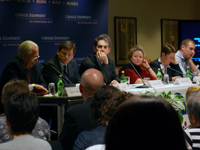Registration
You will receive an email confirming your registration.
IMGXYZ3275IMGZYXVladimir Putin’s expected return to the presidency has led many to give up on the idea of free elections in Russia. However Eurasia Foundation’s latest documentary film, showed how democracy is still possible at the local level.
Carnegie’s Russia and Eurasia Program and Eurasia Foundation hosted a special screening of Made in Berdsk: a Story of One Protest Vote, the third film in a series of short documentaries that explores regional elections in Russia. This film tracks the mayoral race in the Siberian town of Berdsk. When the front-runner from the ruling United Russia party refuses to participate in a debate organized by the local newspaper, the move backfires at the ballot box—triggering a rare runoff election against a charismatic young communist.
After the screening, Galina Komornikova of Kurier.Sreda.Berdsk and journalist Dmitry Dedyshev, both local activists from Berdsk, joined the maker of the film, Maria Eismont of New Eurasia Foundation, Peter Baker of The New York Times, and Carnegie’s Ambassador James F. Collins for a panel discussion on democracy in Russia. Carnegie’s Thomas de Waal moderated.
Countering Apathy and Cynicism
Panellists agreed that the film countered the widely held notion that ordinary people cannot affect change in Russia. But they were cautious as to whether the experience of Berdsk could be repeated at a higher level. The film demonstrated how the abolition of single-mandate seats in the State Duma had been a big blow to Russian democracy, said Collins.
Role of Debates
- Rarity of debates: The role of the pre-election debate in Berdsk is particularly significant, considering that since United Russia came to power, pre-election debates ceased to be held, remarked Eismont. Neither Putin nor Medvedev ever participated in such debates, she added.
- Local elections committee: In addition, the head of the city’s election committee in Berdsk played a key role in the elections by holding honest elections, Eismont said. “No one would have noticed if the votes for the United Russia candidate amounted to 51 percent instead of 45 percent,” she said. Despite his personal support for United Russia, he placed honesty in his job before any convictions or political pressure, she asserted.
Life in Berdsk After Elections
- A short-lived victory? Komornikova and Dedyshev reflected on life in Berdsk after last spring’s tumultuous elections. Although there have been positive changes enacted by local government, Komornikova remains skeptical that the current trend will continue and is wary of the growing lack of transparency in local government.
- An independent media outlet: One of the most important issues in Russian towns like Berdsk is the presence of an independent arena where local residents can voice their concerns, added Komornikova. In contrast to national media which caters to the Kremlin, Komornikova is convinced that the local newspapers have the potential to play a watchdog role for regional governments and remain independent.
